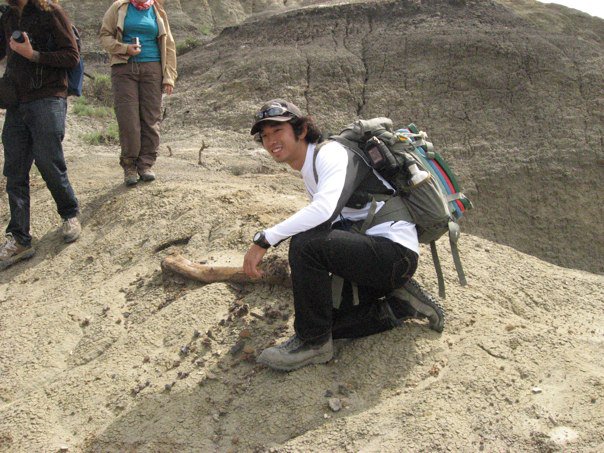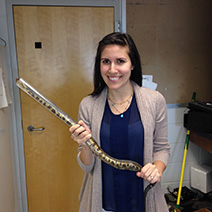Abstract to Contract Research Poster Competition Caps Graduate Education Week

Daigo Yamamura, a doctoral student at the University of Arkansas who is entered in the Abstract to Contract poster competition, poses with a dinosaur fossil in Makoshika State Park near Glendive, Montana.
FAYETTEVILLE, Ark. – Snakes, political ideologies and dinosaur fossils.
Those are among the research topics that will be on display at the University of Arkansas graduate research competition that caps Graduate Education Week, which started Monday. Nearly 140 graduate students from all academic areas on campus will compete for prizes as they present the results of their research and creative work in the seventh annual contest, “From Abstract to Contract: Graduate Student Research Poster Competition.”
The public viewing and judging portion of the competition will be from 1 p.m. to 3 p.m. on Friday at Mullins Library. In addition to the Graduate School and International Education, sponsors of the competition also include the Career Development Center and University of Arkansas Libraries. The prizes are $200 for first place and $100 for second in each of the 14 categories.
 |
|
John Blanchar |
John Blanchar, a doctoral student in experimental psychology, will present his poster, “Automatic, Type 1 Information Processing Favors Conservative Ideology.”
When people use low-effort thought – called “Type 1” information processing – they are more likely to endorse conservative ideology, explained Blanchar, a Distinguished Doctoral Fellow in the Department of Psychological Sciences in the J. William Fulbright College of Arts and Sciences.
“I argue that automatic, Type 1 information processing – thinking that is quick, less effortful, pre-intentional, and intuitive – favors political conservatism over liberalism,” said Blanchar, who has published research on the subject with his adviser, Scott Eidelman, an associate professor of psychological sciences.
“These are automatic judgments,” Blanchar said. “People using Type 1 information processing will endorse conservative principles more than they endorse liberal principles. Automatic, Type 1 processing promotes judgments that emphasize personal responsibility, for example, the poor are poor because they are lazy. This is an example of how reliance on Type 1 processing promotes conservative attitudes and views.
“On the other hand, Type 2 processing, which is effortful thinking that features more time and mental resources, can override or alter our immediate, automatic impressions,” he said. “Not being able to engage in effortful, Type 2 processing forces people to instead lean on the products of Type 1 processing, which promotes conservative attitudes and views. This is what my research largely demonstrates.”
In addition to his Distinguished Doctoral Fellowship, Blanchar is a National Science Foundation Graduate Research Fellow. Originally from Indianapolis, he received a Bachelor of Science degree in psychology from Indiana University-Purdue University Indianapolis in 2010.
 |
|
Brenna Levine holds a cottonmouth snake, using a protective tube that restrains the snake in a way that is safe for both Levine and the snake. |
Brenna Levine, a doctoral student in biology, will present her poster, “Reproductive Success and Sexual Selection in a North American Pitviper.”
Drawing from her master’s thesis, Levine examined the mating system of the copperhead snake at its most northern distribution.
“I used genetic markers to infer parentage and kinship amongst copperhead individuals in a single population in Connecticut,” Levine said. “Since I knew the maternity of the offspring, I could estimate their paternity by looking at the genotypes of the males. Copperheads can have multiple paternities, where a single clutch can have multiple fathers. With copperheads, there many more males than females and females don’t mate annually. It turned out that there was greater sexual selection among males, causing them to mate with more females. The males not only had more mates than females did, but also yielded more offspring from mating.”
The results of this study are important in furthering the understanding of sexual selection in snakes, Levine said. Snakes have interesting aspects about their reproductive ecology that we don’t see in other animals, she said.
“With snakes, it is often hard to observe copulation, and then you have other complicating factors like multiple paternity or sperm competition,” she said. “Snakes are increasingly becoming the model organism of choice for sexual selection studies because they don’t have aspects that complicate studying this in other animals. For example, the male snakes don’t give gifts to females and they don’t participate in parental care. The males mate and all they leave is their DNA.”
“What I love about using genetics and genomic tools is that we are able to peek into what they are not showing us,” she said. “It’s like sleuthing.”
Originally from Pittsburgh, Levine holds a Bachelor of Science in wildlife biology from Colorado State and earned a Master of Science in biology from the U of A in 2012. She has published her research with her faculty adviser, Marlis Douglas, an associate professor in the Department of Biological Sciences in Fulbright College.
Daigo Yamamura, a doctoral student in geology, will present his poster, “Effects of depositional environment, assemblage taphonomy and diagenesis on vertebrate skeletal preservation in a crevasse splay deposit, Upper Cretaceous Hell Creek.”
Yamamura uses advance microscopic techniques to investigate the process of fossilization, specifically the skeletal remains of dinosaurs in the Late Crustaceous Hell Creek Formation, an intensively studied formation of rocks in North America, named for exposures studied along Hell Creek in Montana.
“Hell Creek is famous for dinosaur fossils,” Yamamura said. “The fossilization process of vertebrate skeletal remains is poorly understood. We’ve had 65 million years between the death of dinosaurs and finding those fossils, so as a geologist, I am curious about what kind of environmental processes preserved these fossils.”
Using techniques such as field observation, stratigraphy – the study of rock layers – the microscopic study of rocks known as petrography and scanning electron microscopy and X-ray diffractometry, Yamamura has identified the diagenesis – the physical and chemical changes occurring during the conversion of sediment to sedimentary rock – to tectonic events and determine how fossils were preserved in the Hell Creek formation.
Yamamura, who is originally from Yokohama, Japan, earned two Bachelors of Science and a Master of Science in ecology and Earth Sciences at Montana State University. His faculty adviser is Celina Suarez, an assistant professor in the Department of Geosciences in Fulbright College.
Topics
Contacts
Chris Branam, research communications writer/editor
University Relations
479-575-4737,
cwbranam@uark.edu
Headlines
U of A Bands to Hold Three Nights of Concerts
The Symphonic Band, the Wind Symphony, the 4 O'Clock and 5 O'Clock Bands and the Wind Ensemble will perform April 21-23 at the Faulkner Performing Arts Center on the U of A campus.
Honors College to Host 'Best in Show' Dog Celebration
The campus and community are invited to celebrate our furry friends with popsicles, water and dog treats from 3-4 p.m. Thursday, April 25, in the Gearhart Courtyard.
New Parasite Affecting Canadian Partridges Named for Arkansas Poultry Scientist
A long-time colleague in Canada gave a newly found parasite the scientific name Eimeria hargisi in honor of U of A poultry science researcher Billy Hargis.
U of A School of Law Student Selected for Ms. J.D. Leadership Academy Intensive
Tristan Branstetter-Thomas, a second-year law student, was one of 30 students from across the country chosen to participate in the leadership academy at the Northwestern Pritzker School of Law in Chicago.
Needy Honored as Distinguished Alumna of University of Pittsburgh Engineering College
College of Engineering Dean Kim Needy was among seven alumni of the University of Pittsburgh Swanson School of Engineering honored in April as part of the 2024 Class of Distinguished Alumni.




